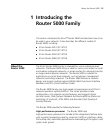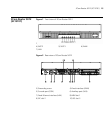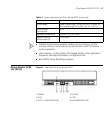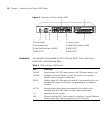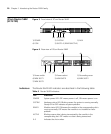14 Chapter 1: Introducing the Router 5000 Family
Multiple interface card/interface module options The Router 5000
provides SIC slots and MIM slots for installing expansion modules
including serial interfaces, T1/CT1/PRI interface, E1/CE1/PRI interface, BRI
S/T and U interfaces, Ethernet interface (including FE/GE, electrical
interface and fiber interface), ADSL/G.SHDSL interface, ATM 25M/155M
interface, and so on.
Multiple channels of asynchronous serial interface access The
router can operate as a small Internet access server when connected to
PSTN (Public Switched Telephone Network) via the asynchronous serial
interface. With an analog Modem interface card, the router can be
directly connected to PSTN to serve as a small access server.
Ethernet access solution By extending SICs and MIMs, the
Router 5000 can provide multiple forms of Ethernet interfaces, such as
optical/electrical interface, 10/100/1000Mbps interface. Thereby, the
networking capability of the router can be significantly improved.
Voice capabilities The Router 5000 support multiple voice interface
modules, which can provide such interfaces as FXO/FXS/E&M, E1VI, T1VI.
With high-speed CPU and digital signal processing (DSP) technology, the
Router 5000 can provide voice over IP (VoIP) services with high quality
voice.
xDSL/MPLS features The ADSL/ADSL-I/G.SHDSL module for the
Router 5000 allows the medium-to-small-sized enterprises to access the
Internet over DSLAM equipment via PSTN. MPLS, a combination of IP and
ATM technologies, provides faster forwarding speed, get support from IP
routed protocols, and control protocols, thus satisfying the requirements
that various new applications put on the network.
Data Security Supports ID authentication protocols, including PAP
(Password Authentication Protocol), CHAP (Challenge Handshake
Authentication Protocol), RADIUS (Remote Authentication Dial in User
Service), TACACS+, firewalls, VPN (Virtual Private Network, including
GRE, L2TP), provides IPSec (IP Security), IKE (Internet Key Exchange)
technologies, and backup solutions.
Online software upgrade The onboard Flash memory allows you to
upgrade the software online, add new features, and extend new
functions.










